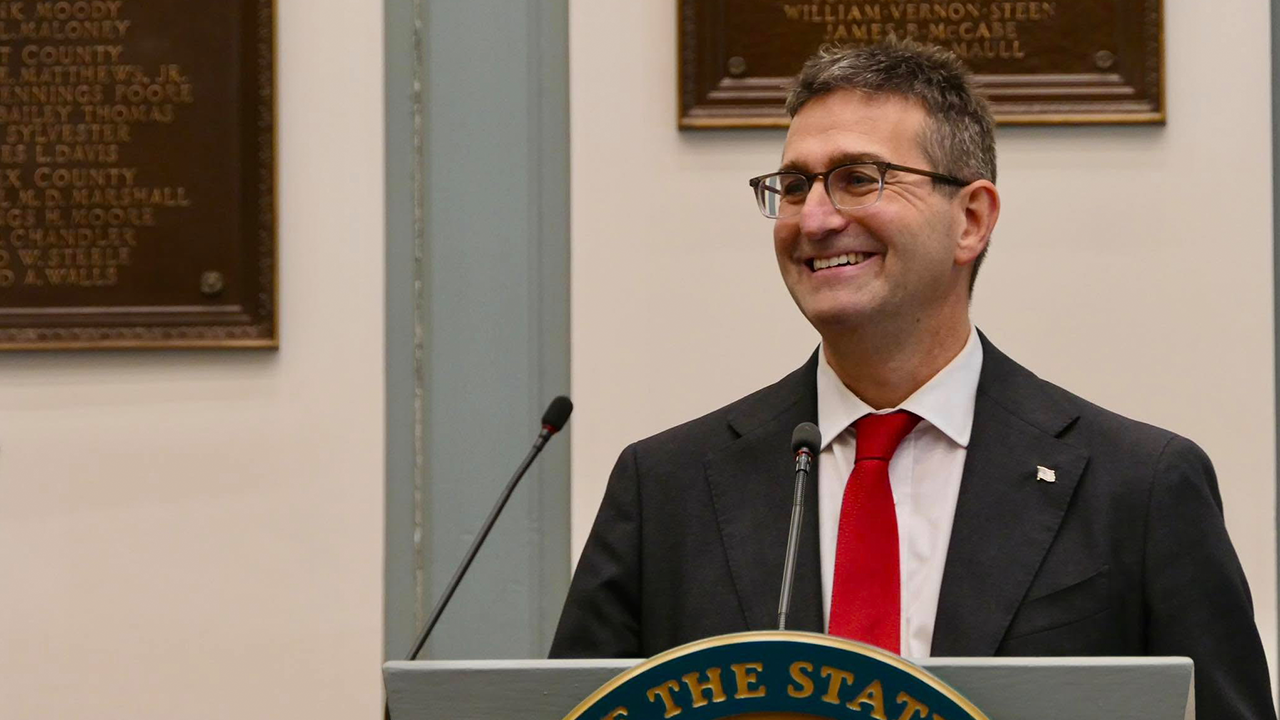Louisiana
Will Sutton: Big talent from a small Louisiana town saved our nation

Yes, a young Black woman who grew up in the small towns of Clinton and Baker, outside of Baton Rouge, was the reason a debt ceiling deal got done. Young, 45, is the director of the Office of Management and Budget, one of the most important positions in the federal government — and an expert on budget matters.
A few weeks ago, President Biden had a staunch “no negotiation” stance toward House Speaker Kevin McCarthy and the debt ceiling. Biden wanted a clear separation between saving the nation from default and negotiating budget specifics. McCarthy was determined to cut the budget to make a political statement, despite knowing that not raising the debt limit would wreak financial havoc upon millions of Americans and the world.
McCarthy sent senior Republican officials to the negotiating table. Biden chose an unelected aide who knew more about the federal budget than anyone else in the room — including Biden.
Based on reports coming out of the negotiations, it sure looked like one side had figureheads who couldn’t make a decision while the other respected and trusted Young enough to send her in with a singular order: “You make the calls.”
Talks eventually got beyond Biden’s “no negotiation” posture to some intense bargaining.
Ultimately, Young emerged from the talks with a tentative bipartisan deal. She joined Steve Richetti, Counselor to the President and a longtime Biden insider; John Podesta, senior advisor to the president for Clean Energy Innovation and Implementation; and other White House officials in presenting the plan to anxious Democrats.
Young led the presentation, laying out the plusses and minuses of the deal. She sold it to the Democratic Caucus during a closed-door meeting in the Gabriel Zimmerman Meeting Room in the U.S. Capitol. Members only. No cell phones.
“My job is to tell members what’s in the bill,” she told the Washington Post. “You get into trouble when you try to tell members what their opinion is. …Our job is to say, ‘This is what’s in the bill. This is how some of the worst things Republicans wanted were mitigated.’”
After Young finished, she received a standing ovation and teared up, according to U.S. Rep. Troy Carter, D-New Orleans, who was in the room on May 31.
“Shalanda Young is a rock star,” the congressman told me Thursday. “She was not just in the room. She was the pivotal player.”
McCarthy and his Republican colleagues might say otherwise, but the truth is they went for the jugular. They threatened to put the nation in default unless Biden and his team agreed to drastic cuts. They wanted to cut funding for veterans who served our country. They wanted to cut food benefits for poor people. They wanted to take away Social Security benefits.
Those ideas can be debated, but you shouldn’t talk about things you want to cut in the future when it’s time to pay for things you’ve already purchased.
Young stood her ground on core issues while listening to the Republican demands — and finding agreement.
She was ready for this moment. She spent 20 years dealing with the budget as a congressional staffer. She knew the Republicans’ “tax and spend” arguments and the Democrats’ desires to take care of people. She knows where the money is, and she knows the impact of budget cuts and tax increases.
Now, our nation can take a moment to exhale — and thank Young.
She built bipartisan respect because she’s competent, fair, firm and willing to listen.
“Everybody in this place knows her, respects her greatly,” McCarthy told reporters last month.
“Shalanda Young is incredibly talented,” U.S. Sen. Bill Cassidy shared with me in a statement. “Whatever your politics, we can be proud of this native daughter of Louisiana.”
Leading Democrats agree.
“Director Young’s powerful intellect, calm demeanor and relentless work ethic were essential in helping to save our economy, protect Social Security and Medicare and suspend the debt ceiling until 2025,” said House Democratic Leader Hakeem Jeffries.
Congressman Carter added context when asked what message Young’s success sends to African-American girls in Louisiana. “This could be you, too” Carter said. “A young Black woman from Clinton did this — and you can, too.”

Louisiana
Why a plantation house fire ignited a heated debate over slavery’s legacy

A fire that ravaged Nottoway Plantation, one of the Deep South’s largest pre-Civil War mansions, sparked a wave of mixed reactions online, ranging from jubilation to dismay. The Louisiana landmark, where countless enslaved Africans once toiled, became a symbol of conflicting emotions as video footage of the blaze spread across social media.
For some, the fire represented a form of belated justice for the suffering endured by enslaved ancestors. The internet buzzed with memes and celebratory posts, some featuring the burning mansion set to Usher’s “Let It Burn,” while others amplified the crackling sounds of the fire to evoke a sense of catharsis.
Historian Mia Crawford-Johnson captured the sentiment with a grinning selfie taken near the charred remains, captioned, “Went and watched (Nottoway Plantation) burn to the ground!”
However, the fire also brought sadness to some. Nottoway Plantation had served as a popular venue for weddings and other celebrations, holding cherished memories for many. The destruction also represents a significant loss of historical record, erasing the physical testament to the ingenuity and skill of the enslaved people who built and maintained the plantation.
Preservationists say the jubilant reactions to the charred mansion reflect the trauma and anger many people, especially Black Americans, still carry over the history and legacy of chattel slavery in the United States. Antebellum era plantations were built under grueling conditions on the backs of enslaved people, and many are now sites of honor on the National Register of Historic Places.

Some plantations try to ignore their past
But some plantations also de-emphasize or overlook their full histories, foregoing mentions of slavery altogether. That is why the “good riddance” sentiment seemed to outweigh expressions of grief over Nottoway Plantation, which makes no mention of enslaved former inhabitants on its website.
Many sites of enslavement in the U.S. have been repurposed as places that actively participate in the erasure of their history, said Ashley Rogers, executive director of the Whitney Plantation Museum, located 40 miles (65 kilometers) west of New Orleans. She said the burning of Nottoway is not actually part of the movement for preservation, since nothing was truly being done on the property to tell its full history.
“It was a resort,” Rogers said. “I don’t know that it being there or not being there has anything to do with how we preserve the history of slavery. They already weren’t.”
Joseph McGill, executive director of the Slave Dwelling Project, a nonprofit focused on helping the U.S. acknowledge its history with slavery, said the reaction from the Black community about Nottoway burning represents years of complicated emotions related to plantations. But as a preservationist, McGill said it is unfortunate Nottoway burned down, even if it was failing at telling history.
“I would like to see buildings preserved so that those buildings could tell the stories of all the people who inhabited those spaces,” McGill said. “We have been failing at that, but at least when the buildings are there the opportunity always exists to do the right thing.”
Nottoway Plantation became a resort and event venue
Before the fire, Nottoway was a resort and event venue, and its website described it as “the South’s largest remaining antebellum mansion.” Iberville Parish President Chris Daigle called the plantation “a cornerstone of our tourism economy and a site of national significance.”
The sprawling property exists on a former sugar plantation owned by sugar baron John Hampden Randolph. Located about 65 miles (105 kilometers) northwest of New Orleans, the 53,000-square-foot (4,924-square-meter) mansion had a three-story rotunda adorned with giant white columns and hand-carved Italian marble fireplaces, according to a description on its website. A brochure advertises 40 overnight rooms, a honeymoon suite, a lounge, fitness center, outdoor pool and cabana, among other resort features.

In 1860, 155 enslaved people were held at the property, National Park Service records show.
After the blaze, which drew an emergency response from nearly a dozen fire departments from surrounding towns, the property’s owner said the fire had led to a “total loss” and that he hoped to rebuild the mansion.
Rogers said it is unfortunate Nottoway’s mansion burned down, as it did serve as a testament to the “skill of enslaved craftspeople and free people of color who built it and who did a lot of the incredible design work that was inside of that building.”
There are plenty of plantations, unlike Nottoway, that do not allow weddings or other celebratory events. For example, the Whitney, which documents slavery at a pre-Civil War plantation, draws tens of thousands of visitors annually and is known for centering the stories of enslaved people.
The Nottoway fire has also restarted a public discourse over plantations. Rogers, the Whitney museum director, said this is not new discourse, but can feel like such because there are not many places where productive conversations can be had about slavery and how to tell its history.
Racism and slavery dominate cultural debates
How, where and when to talk about the history of U.S. racism and slavery has dominated political and cultural debates in recent years. An executive order issued in March by the Trump White House seeks to root out “divisive, race-centered ideology” in the Smithsonian Institution, which operates a broad range of cultural centers in Washington. Among the order’s targets is the National Museum of African American History and Culture, a popular Smithsonian attraction that chronicles chattel slavery, Jim Crow segregation and its lingering effects.
Relatedly, plantations and other national historic sites with ties to civil rights have long been places where visitors and descendants of enslaved people go to learn about the past. But they are also places where visitors may encounter naysayers and deniers challenging the tour guide’s presentation about slavery.
Rogers said there are plenty of others sites besides Nottoway accurately telling Black history that need to be preserved.
“I don’t think one plantation burning down is going to change how we talk about slavery in this country,” she said. “All it does is exposes wounds that are already there.”
Louisiana
Louisiana House passes bill to prohibit DEI offices, training in state agencies, colleges

University of Akron President R.J. Nemer talks about DEI
University of Akron President R.J. Nemer says “I want everybody to feel like there’s a place here.”
- The Louisiana House passed a bill banning DEI offices, training, and hiring policies in state agencies and public colleges.
- The bill sparked a heated debate, dividing largely along racial lines, with Black representatives opposing it as racially insensitive.
- Supporters argue the bill promotes unity and merit-based practices, while opponents express concern over its potential impact on minority groups and community relations.
- The bill now moves to the Senate, and if passed, Louisiana will join other Republican-led states restricting DEI policies.
BATON ROUGE — The Louisiana House Monday night passed a controversial bill that would prohibit diversity, equity and inclusion offices, training and hiring policies in state agencies and public colleges.
The bill passed, 57-32, after an emotional and deeply divided debate that largely fell along racial lines.
House Bill 685, by Rep. Emily Chenevert, R-Baton Rouge, now moves to the Senate. It is part of Gov. Jeff Landry’s legislative agenda.
Ten Black representatives spoke in opposition to the bill, calling it divisive, unnecessary, and racially insensitive.
“This is the most racially oppressive piece of legislation I have ever had to debate since I have been in office,” said Rep. Candace Newell, D-New Orleans.
The bill would ban mandatory DEI training and race- or gender-based hiring or admissions preferences. It also would eliminate public DEI offices and initiatives, including prohibiting required DEI coursework at public universities.
Chenevert said the bill aims to keep Louisiana compliant with President Donald Trump’s executive orders and protect the state’s federal funding. The Trump administration is investigating several universities nationwide, though Louisiana universities have not been targeted so far.
She stressed the bill does not ban teaching DEI concepts, only the requirement of DEI-focused coursework for graduation. She also raised concerns about fairness in sports.
“My biggest concern is that it has hurt more female athletes across this country than it has helped,” she said. “Biological men have taken the places of biological women.”
Rep. Denise Marcelle, D-Baton Rouge, called the bill “a step backwards” and accused Chenevert of ignoring the benefits DEI programs have provided, especially for white women.
“Are you aware that more white women, like you, have benefitted from DEI than whoever you’re referring to?” Marcelle said. “If we had equal opportunity to be at the table, there would be no need for the program.” She added she was appalled a woman would bring this bill.
Rep. Terry Landry, D-New Iberia, sworn in just hours before the vote, said voters he spoke to during his campaign were not focused on DEI.
“They’re worried about schooling for their children, the economy, state issues,” he said. “This bill is unnecessary.”
Rep. Rodney Lyons, D-Harvey, questioned the bill’s economic impact, particularly the elimination of the Department of Agriculture’s Minority Affairs Program, which supports minority and veteran farmers, a large portion of the state’s agricultural community.
Marcelle also warned the bill could interfere with police training on race and community relations.
Supporters said the legislation promotes unity and merit.
“I keep hearing diversity is what makes us strong, but it is not,” said Rep. Beryl Amedee, R-Gray, defending Chenevert. “What makes us strong is unity… There’s only one race, and it’s human.”
Rep. Chuck Owen, R-Rosepine, expressed his frustration with the debate. “I see us talking past each other,” he said. “I hear us talking past each other.”
The bill requires annual compliance reports and tasks the legislative auditor with enforcement. An accompanying fiscal note projects minor cost savings, including $174,000 from cutting the Agriculture Department’s DEI office.
If passed by the Senate and signed into law, Louisiana would join a growing number of Republican-led states rolling back public DEI policies.
Chenevert became emotional in her closing remarks, saying everyone views the issue differently. She framed her perspective from a biblical viewpoint, emphasizing that no matter our skin tone, “we all share the same blood.”
Louisiana
Louisiana State Police captures 4th escaped inmate in NOLA prison break, 6 still at large

A fourth inmate has been captured by authorities after escaping from a New Orleans jail on Friday with six other convicts.
“Louisiana State Police just captured inmate Gary C. Price,” FBI New Orleans confirmed in a post on X.
7 FUGITIVES REMAIN ON THE RUN AFTER NOLA PRISON BREAK; INSIDE JOB SUSPECTED
“The FBI and our law enforcement partners remain out on the street this evening searching for the remaining six. If you have any information please call 1-800-Call-FBI or send us a tip online,” the post continued.
Price, 21, was charged with seven counts of attempted first-degree murder, two counts of second-degree battery, aggravated assault with a firearm, false imprisonment with a weapon, domestic abuse, simple assault, aggravated criminal damage to property and resisting an officer, according to officials.
Officials said Price will ultimately be transported to a secure state facility outside the area and booked.
NEW ORLEANS JAIL INMATES CHARGED WITH MURDER AND OTHER CRIMES ESCAPE
10 inmates escaped from the jail, according to authorities. (Orleans Parish Sheriff’s Office / WVUE)
Authorities said that some fugitives may have left the city or the state of Louisiana, and the public has been urged to stay alert, not be alarmed and report any tips. The FBI in a statement said it has “surged resources” and is offering up to $5,000 for tips leading to the arrest of the inmates.
A source confirmed to Fox News that authorities have come close to detaining others, but the “timing has been off.”
The source added it’s possible the remaining fugitives have left New Orleans, but it’s believed most, if not all of them, are still here.
Police said that “over 200 Law Enforcement personnel from various local, state, and federal agencies continue to work around the clock to locate the remaining fugitives.”
The six fugitives still on the run are Jermaine Donald, 42; Antoine Massey, 33; Leo Tate, 31; Lenton Vanburen, 27; Derrick Groves, 27; and Corey Boyd, 19.
The fugitives on the run are:
- Corey E. Boyd, 19, charged with second-degree murder, attempted second-degree murder, aggravated battery, illegal carrying of weapons involving a crime, and obstruction of justice.
- Lenton J. Vanburen Jr., 26, charged with illegal carrying of weapons, possession of a firearm or weapon by a felon, obstruction of justice and introducing contraband in prison.
- Jermaine Donald, 42, charged with second-degree murder, aggravated battery, possession of a firearm or weapon by a felon and obstruction of justice.
- Antoine Massey, 32, charged with domestic abuse involving strangulation, theft of a motor vehicle and a parole violation.
- Derrick Groves, 27, charged with three counts of attempted second-degree murder, two counts of second-degree murder and battery of a correctional facility employee.
- Leo O. Tate Sr., 31, charged with simple burglary of an inhabited dwelling, possession of a firearm or weapon by a felon, illegal carrying of a weapon, motor vehicle theft and multiple drug charges.
Louisiana State Police released images of the captured fugitives being led into a helicopter on Friday night.
Kendall Myles, 20, was apprehended after a brief foot chase through the French Quarter soon after the escape. He had previously escaped twice from juvenile detention centers.
By Friday evening, two more fugitives had been captured. Officials found Robert Moody, 21, in New Orleans thanks to a Crimestoppers tip, according to Orleans Parish Sheriff’s Office. Dkenan Dennis was found near the Chef Menteur Highway, Louisiana Attorney General Liz Murrill announced on the social platform X.
Orleans Parish Sheriff Susan Hutson said Friday it’s unlikely the inmates could have escaped without some kind of help.
Attorney General Liz Murrill said that they “clearly dropped the ball and there’s no excuse for this.”
LOUISIANA GOVERNOR BLASTS ‘PROGRESSIVE PROMISES’ AFTER NEW ORLEANS JAIL ESCAPE

The captured inmates being led to a helicopter. ( Louisiana State Police)
She is calling for a full investigation of the incident.
A female civilian employee monitoring the pod “stepped away” to get food and missed the getaway, according to authorities.
Officials said the video feed was not being actively monitored at the time, but it was reviewed after the inmates were discovered missing hours later.
The escapees were not discovered missing until a routine headcount at 8:30 a.m. Friday.
The jail is only at 60% staffing, and at the time of the escape, four supervisors and 36 staff members were monitoring 1,400 inmates, authorities said.
Three jail employees have been placed on administrative leave pending the outcome of the investigation, authorities said.
CLICK HERE TO GET THE FOX NEWS APP
Retired FBI special agent Jason Pack tells Fox News Digital that “the jailbreak in New Orleans should get everyone’s attention.”
“This wasn’t a complicated escape. Ten inmates got out through a hole behind a toilet,”Pack said. “It took more than seven hours before anyone noticed they were gone. That tells you a lot about what’s going on inside that jail. Too few people on staff. Not enough oversight. And likely not enough working equipment or security checks.”
Pack said that the number one goal for law enforcement is to get all the inmates back into custody quickly and safely.
“Police don’t want this to end with anyone getting injured, including the escapees. The goal is to find them, surround them, and bring them in without any drama. That’s what officers train for. It’s not about chasing headlines. It’s about doing the job carefully and professionally, even when the public is watching,” Pack said.
Fox News Digital’s Michael Dorgan and Alex Koch contributed to this report.
Stepheny Price is a writer for Fox News Digital and Fox Business. She covers topics including missing persons, homicides, national crime cases, illegal immigration, and more. Story tips and ideas can be sent to stepheny.price@fox.com
-

 Technology1 week ago
Technology1 week agoMexico is suing Google over how it’s labeling the Gulf of Mexico
-

 Politics1 week ago
Politics1 week agoDHS says Massachusetts city council member 'incited chaos' as ICE arrested 'violent criminal alien'
-

 Education1 week ago
Education1 week agoA Professor’s Final Gift to Her Students: Her Life Savings
-

 Education1 week ago
Education1 week agoVideo: Tufts Student Speaks Publicly After Release From Immigration Detention
-

 Politics1 week ago
Politics1 week agoPresident Trump takes on 'Big Pharma' by signing executive order to lower drug prices
-

 Culture1 week ago
Culture1 week agoTest Yourself on Memorable Lines From Popular Novels
-

 News1 week ago
News1 week agoAs Harvard Battles Trump, Its President Will Take a 25% Pay Cut
-

 News1 week ago
News1 week agoWhy Trump Suddenly Declared Victory Over the Houthi Militia


:focal(1x431:2999x2000)/static.texastribune.org/media/files/8b56b90163b9181591141e02785a95c5/0422%20We%20Wont%20Go%20Back%20Presser%20TT%20EG%2005.jpg)














